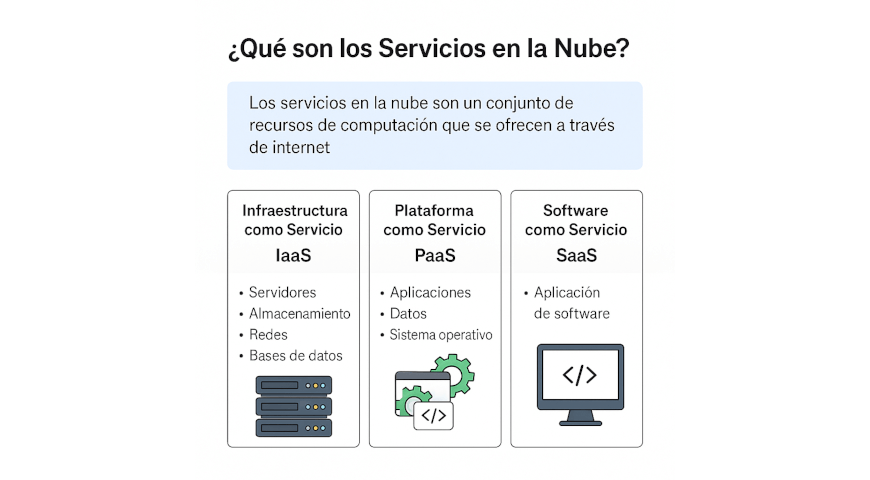What are cloud services? A clear definition
Imagine that instead of saving your photos on your home computer, you upload them to an online platform. The cloud is something similar, but on a larger scale. Cloud services are a broad set of computing resources (from servers, storage, and databases to software, networks, and artificial intelligence) that are offered over the internet ("the cloud"). Instead of companies buying and maintaining their own physical infrastructure, they can rent access to these services from a specialized provider.
Main cloud service models: IaaS, PaaS, and SaaS
Cloud services are generally divided into three main models. Understanding them is key to knowing what type of service your company needs.
Infrastructure as a Service (IaaS)
This is the most basic model. You rent the IT infrastructure: servers, storage, and networks. You have full control over the operating system and applications, but the provider takes care of the physical hardware. It's like renting a plot of land to build your house: you decide everything, from the foundation to the roof.
- Ideal for: Companies that want maximum control and flexibility, startups that need to scale quickly, and for temporary or experimental workloads.
Platform as a Service (PaaS)
This model provides you with a complete platform to develop, test, and deploy applications. The provider manages the hardware and operating system, so you only have to worry about your applications and data. It's like renting a fully equipped workshop: you have all the tools to create, but you don't own the building.
- Ideal for: Developers who want to focus on creating software without worrying about the necessary infrastructure.
Software as a Service (SaaS)
This is the best-known model. The provider offers you a complete software application that you access over the internet, usually with a subscription. You don't manage any of the infrastructure; you simply use the software.
- Ideal for: Companies looking for ready-to-use solutions, collaboration applications, and business software that does not require customization.

Types of Cloud: public, private, hybrid, and multicloud
In addition to service models, there are different ways to deploy the cloud:
Public Cloud
The services are owned by a third-party provider that offers them to multiple customers over the internet. It is the most common model and offers enormous scalability and a pay-as-you-go model.
Private Cloud
The cloud infrastructure is used exclusively by a single organization. It can be hosted in the company's data center or managed by a third party. It offers greater security and control.
Hybrid Cloud
It combines public and private clouds, allowing data and applications to move between them. It offers the best of both worlds: the flexibility of the public cloud and the control of the private cloud.
Multicloud
It involves the use of multiple cloud services from different providers. This allows companies to choose the best service for each task and avoid dependence on a single provider.
Key benefits of cloud computing
- Cost reduction: Eliminates the need to buy hardware and software, reducing the initial investment.
- Global scalability: Instantly adapt your resources according to demand.
- Improved performance: Access the latest technology and high-speed data centers around the world.
- Advanced security: Large cloud providers invest heavily in security, surpassing what most companies could afford.
- Flexibility and collaboration: Allows teams to work from anywhere and collaborate in real time.
How to get started with cloud services?
1. Assess your needs: What business processes do you want to improve? Do you need storage, computing power, or a specific application?
2. Choose the right model: Decide if you need IaaS, PaaS, or SaaS based on your desired level of control and your technical capabilities.
3. Select a provider: Research the main providers and choose the one that best suits your needs and budget.
4. Migrate gradually: You don't have to move everything at once. Start with a small, non-critical workload to gain experience.
Why the future of your business is in the cloud
Cloud services are no longer an option, but a strategic necessity for any company that wants to compete in the digital world. From agile startups to large corporations, the cloud offers the tools to innovate faster, operate more efficiently, and scale without limits. In 2025, being in the cloud is synonymous with being in business.

